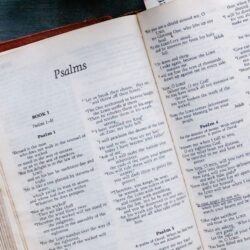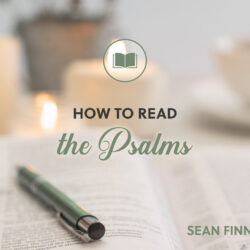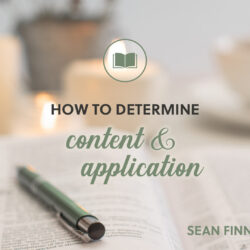This is part 7 of the Read the Bible For Yourself.
The Bible contains a treasure trove of wisdom literature that can help you navigate the ups and downs of life. Today you’ll learn how to read and understand the books of Proverbs, Song of Songs, Job, and Ecclesiastes. Proverbs and Song of Songs teach us how to handle ourselves when the world is working the way it should while Job and Ecclesiastes address how to think and live when chaos strikes. Taken together these four books offer a full-orbed perspective on practical wisdom that you can incorporate into your life.
Listen to this episode on Spotify or Apple Podcasts
—— Links ——
- See other episodes in Read the Bible For Yourself
- Other classes are available here, including How We Got the Bible, which explores the manuscript transmission and translation of the Bible
- Get the transcript of this episode
- Support Restitutio by donating here
- Join our Restitutio Facebook Group and follow Sean Finnegan on Twitter @RestitutioSF
- Leave a voice message via SpeakPipe with questions or comments and we may play them out on the air
- Intro music: Good Vibes by MBB Attribution-ShareAlike 3.0 Unported (CC BY-SA 3.0) Free Download / Stream: Music promoted by Audio Library.
- Who is Sean Finnegan? Read his bio here
—— Notes ——
Proverbs
- “[Proverbs] should not be read as promises but as guidelines, as principles for living. They show the way life works best 80 to 95 percent of the time. The Bible is clear throughout Scripture: if you live a life oriented to God, you will tend to have a good life.”[1]
- Proverbs 14:7: Leave the presence of a fool, for there you do not find words of knowledge.
The Fool
- Mouth of a fool brings ruin near (10:14)
- Utters slander (10:18)
- Doing wrong for fun (10:23)
- Broadcasts folly (12:23)
- No restraint, careless (14:16)
- Despises parent’s instruction (15:5)
- Does not receive a rebuke (17:10)
- Has plenty of personal opinions (18:2)
- Perverse speech (19:1)
- Quick to quarrel (20:3)
- Devours wealth (21:20)
- Despises wise words (23:9)
- Vents anger (29:11)
- Hasty in speech (29:20)
The Wise
- Honoring your parents (1:8-9; 10:1)
- Handling money well, avoiding debt (3:9-10; 22:7
- Discernment between right and wrong (3:21; 10:9; 28:5)
- Understanding (3:13; 4:7; 18:2)
- Fidelity in marriage (5:15-19; 6:32-35)
- Hard work instead of laziness (6:6-11; 15:19)
- Fearing the LORD (9:10; 24:21; 31:30)
- Teachability, humility (9:9; 11:2)
- Controlling what you say (10:19; 21:23)
- Righteousness, honesty, morality
(11:3; 12:22; 29:6) - Generosity (11:25; 19:17; 22:9)
- Choosing good friends (12:26; 13:20)
- Disciplining children (13:24; 22:15)
- Patience, slow to anger (14:29; 15:18)
- Self-control (16:32; 25:28; 29:11)
Song of Songs
- This collection of romantic poems is a commentary on Proverbs 5:18-19
- The focus of the book is a woman who pursues and fantasizers about romantic love. Her speech begins the book (1:5-6), ends the book, and utters the key truth of the book (8:6-7).
- Far from relegating women to a passive role, Song of Songs affirms a woman’s desires and her pursuit of them. She does not ignore that her body has yearnings, nor is she ashamed of them. Our heroine knows who she is; she’s in touch with her sexuality. She goes after him, attempting to woo him with her charms. Over and again, the two get separated, and one searches for the other until they find each other, panting with desire. Then, the section abruptly ends, and the two find themselves apart again, ready to repeat the cycle.
- “This poem should be read in light of Genesis 1 and 2. Following the command to “be fruitful and increase in number” (Gen 1:28), God plants a garden (2:8) in which he placed the man and woman he created in his own image. The narrative concludes with the words: “A man will … be united to his wife, and they will become one flesh. The man and his wife were both naked, and they felt no shame” (2:24-25, emphasis added). The picture of sexual love in this book recaptures that scene, where the woman and the man take utter delight and pleasure in each other’s bodies and do so without shame. This is thus God’s way of recapturing both the fidelity and the unity and intimacy of marriage, which the enemy has tried to take away from God’s people by making it seem either titillating outside of marriage or something shameful and unmentionable within marriage.”[2]
Job
- Job 15:20–24
20 The wicked writhe in pain all their days, through all the years that are laid up for the ruthless. 21 Terrifying sounds are in their ears; in prosperity the destroyer will come upon them. 22 They despair of returning from darkness, and they are destined for the sword. 23 They wander abroad for bread, saying, ‘Where is it?’ They know that a day of darkness is ready at hand; 24 distress and anguish terrify them; they prevail against them like a king prepared for battle. - Do the wicked “writhe in pain all their days?” No. Many wicked people are just fine. You must be careful with the book of Job. It is a philosophical treatise, dealing with the question of justice. The key question is whether Job did something wrong to deserve the calamities he experienced. The book answers with a resounding “No,” but does not explain why God allowed Job to suffer so much.
Ecclesiastes
- Ecclesiastes 9:11–12
11 Again I saw that under the sun the race is not to the swift, nor the battle to the strong, nor bread to the wise, nor riches to the intelligent, nor favor to the skillful, but time and chance happen to them all. 12 For no one can anticipate one’s time. Like fish taken in a cruel net or like birds caught in a snare, so mortals are snared at a time of calamity, when it suddenly falls upon them. - “Vanity” הֶבֶל hevel (38x) is the key word in Ecclesiastes.
- Vapor, breath, smoke, pointless
- Smoke appears solid, but you can’t grab it.
- Chasing the wind
- Pursuing money, success, or knowledge is hevel (temporary, fleeting).
- Ecclesiastes 12:13–14
13 The end of the matter; all has been heard. Fear God, and keep his commandments, for that is the whole duty of everyone. 14 For God will bring every deed into judgment, including every secret thing, whether good or evil.
Review
- Proverbs offers conventional truisms that generally work in an ordered world. Pursue wisdom and avoid folly.
- Song of Songs is an anthology of poems celebrating the delights of physical beauty, romance, and sexuality.
- Job disproves the notion that those who suffer calamity deserved it by sinning in some big way.
- Ecclesiastes bemoans the futility of pursuing wealth, success, pleasure, or even wisdom. Life is uncertain, so fear God and keep his commandments.
- Although ultimately all one’s achievements disappear like smoke in the wind, we can enjoy the blessing of enjoying a good meal, working hard, and the delights of marriage.
- Conventional wisdom offers principles that generally work, whereas subversive wisdom acknowledges that chaos and catastrophe strike, resulting in the righteous suffering.
- Reading just one of these books limits you to a partial view of wisdom. Reading them together presents a robust understanding of how to live wisely through the complexities of life in the real world.
[1] George H. Guthrie, Read the Bible for Life (Nashville, TN: B&H Publishing, 2011), 141.
[2] Gordon D. Fee and Douglas Stuart, How to Read the Bible Book by Book (Grand Rapids, MI: Zondervan Academic, 2002), 163.






